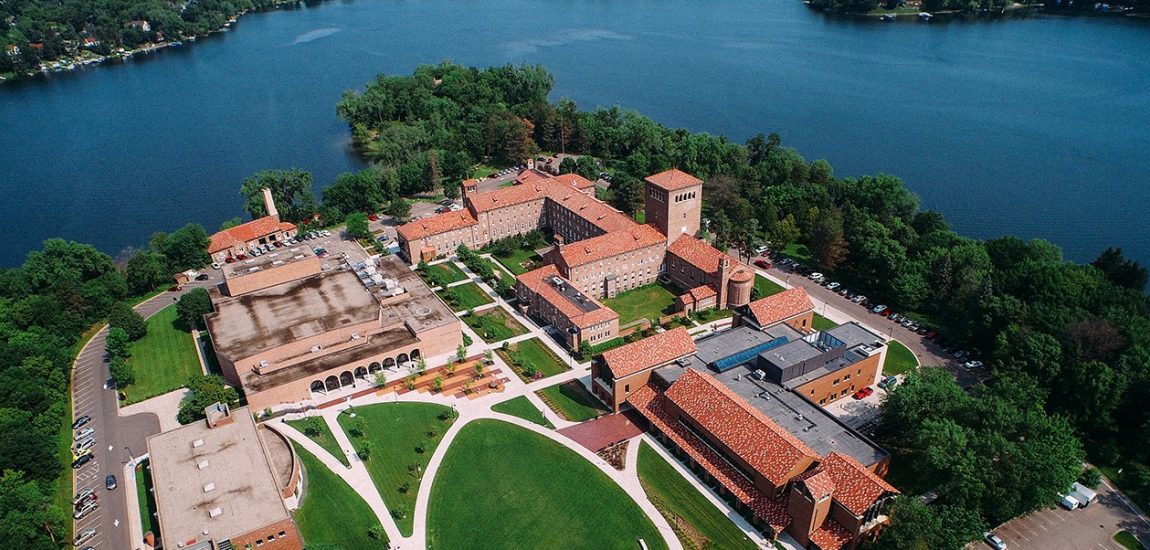“The ultimate excellence is a total and complete reflection of Jesus Christ in all things—in every area and facet of our lives.” — William B. Berntsen, University of Northwestern President 1966-1984
University of Northwestern endeavors to provide education that is grounded first and foremost in the truth of the Bible and in God as the Ultimate Reality of the universe. Based on an intimate knowledge of the Word of God and a deep, growing relationship with Jesus Christ, all other knowledge is interpreted in its properly and accurate perspective. The study of the Bible and theology and the practice of personal spiritual disciplines is the foundation upon which all other disciplines rest. When the apparent truths of an academic discipline conflict with the truth of God’s Word, we put our trust in God’s revealed truth in the Bible.
Having an educational philosophy with its central core steeped in the revealed Word of God, we endeavor to provide a well-rounded education that equips students with a broad understanding of the world God has created. Our approach to education reflects a commitment to the values of community, life-long learning, ministry, integrity and the pursuit of excellence.
This approach enables our students to develop the skills and the knowledge necessary to be effective in a variety of professions, to become leaders, and to be enthusiastic witnesses of God’s truth to the world. University of Northwestern equips students to study the world with rigor, to participate meaningfully in society, to apply critical thinking skills in all inquiries, to express themselves with confidence, and to have an overwhelming sense of God’s infinite wisdom regarding all things.
Foundational Beliefs
We believe that all intellectual inquiry begins with a set of assumptions based on faith. We further believe that, from the beginning, God has revealed truth to humanity by His Word and by His creation. Because of the Fall, sin impairs our capacity to reason rightly and to know truth. It is only God’s redemptive work of new creation through Jesus Christ, revealed in the Bible, that has restored our potential for rightly discerning and interpreting truth.
All creation reflects God’s glory. Likewise, God has invested us with his image that we might glorify Him by seeking to know Him and the design and purpose of His creation. Northwestern, as a community of faith and learning, is dedicated to that inquiry.
At the core of the college’s educational purpose is the pursuit of truth as revealed in the Bible and through God’s creation. Therefore, the study of the Bible is central in our approach to education. Our pursuit of truth begins with the assumption that the Bible is the “governing discipline”—the foundation from which all other disciplines emerge and the ultimate judge of all fields of inquiry. The Bible (correctly interpreted through the guiding instruction of the Holy Spirit and proper interpretive methods) is the lens through which we interpret knowledge discovered in all other subject areas. We believe that there is a consistency between biblical truth and truth discovered through reason and experience; however, we hold that when apparent conflicts occur, all truth claims defer to the truth revealed in the Bible.
God has made his people stewards of his creation and has provided a general revelation of himself through all that he has created. Believers are called to apply their God-given abilities to understand, organize and use what God has revealed. Consequently, University of Northwestern strives to instill in students the desire to pursue truth as a life-long calling, to provide them with the tools to learn the truths in the Bible and in all of God’s creation and to be witnesses of God’s redemptive glory throughout the world.
Educational Values
The college’s foundational beliefs and theological positions result in a commitment to the following core educational values.
COMMUNITY The college seeks to create a learning community that encourages its members to grow academically, spiritually, and abundantly as individuals created in His image. In order to build such a community, Northwestern requires that all members profess faith in Jesus Christ as their Savior and Lord. The community recognizes and respects the contributions that individual and cultural differences make to strengthen the college. Yet, because we are all united in Christ, we emphasize the common bond that we share through our Christian faith. That unity motivates community members to apply biblical truth to decision-making in every area of college life—academic, public, and personal.
LIFE-LONG LEARNING The relentless, lifelong pursuit of truth, knowledge and wisdom is central to the calling of each person who is committed to following Jesus Christ. Believers affirm Christ’s involvement in all of life and recognize that all things have been created by and for him. Therefore, we must explore the creation and develop its resources as we nurture our own God-given creativity. Accomplishing these tasks requires an integration of faith with learning and culture and a submission of every aspect of thought and life to the will and the wisdom of God.
MINISTRY Christians are to use their God-given abilities in Christ’s service. Individuals who bear Christ’s image must be able to integrate faith and learning as they bear witness of him to the world. Therefore, servant leadership and ministry that communicates God’s truth effectively are part of the sacred calling in an individual’s life. The college seeks to nurture this calling throughout its living and learning community. Servant leaders committed to God’s truth have a positive influence in their homes, communities, and professions.
INTEGRITY Integrity is a hallmark of Northwestern’s existence as a community committed to the Lordship of Christ. As individuals and as an institution, we strive for moral consistency between our stated beliefs and our actions. We strive to deal with one another and with those outside the college with honesty and fairness in all academic affairs, policies, financial dealings, and publications.
PURSUIT OF EXCELLENCE Members of the learning community bear witness to God’s character of excellence. High standards for teaching, scholarship and performance, with a commitment to continual development, characterize a learning community that seeks to demonstrate excellence in all of its endeavors.
WISDOM AND LEADERSHIP IN THE CULTURE Acquiring a biblical worldview is a mandate for each person committed to following Jesus Christ. Members of the college community must learn to interpret culture from a biblical standpoint and to influence it accordingly. At University of Northwestern, a community of faith and learning, we dedicate ourselves to this task for the glory of God.
Educational Framework
CURRICULUM The University of Northwestern curriculum is built on its foundational beliefs and educational values. The curriculum affirms our commitment to the mission of the college and the Christ-centered faith. Through the formal curriculum, as well as structured experiences outside of the classroom, Northwestern seeks to prepare graduates for a life of servant leadership and effective vocation. The college curriculum’s ultimate learning outcome is to enable graduates to discern what is true, good, and noble in all disciplines through critical examination within their field of study. To this end, the curriculum is designed to assist students in the pursuit of truth as revealed in God’s Word and in the living truth revealed in His creation and sustaining work in the world.
The University of Northwestern curriculum is composed of general studies, electives, and a required academic major. The Bible is the theological frame of reference for the curriculum. Study of Scriptures and theology woven within the tapestry of the general core curriculum provides graduates with the knowledge to apply biblical principles in the development of a Christ-centered worldview.
Completion of an academic major provides depth of knowledge and equips graduates to integrate faith and knowledge within their field, laying the foundations for graduate work, career and professional development. Graduates are encouraged to add breadth to their academic programs through completion of elective courses and experiences as program structures allow. A wide range of co-curricular and extra-curricular activity enriches and complements the community life and educational experiences of students.
METHODOLOGY The University of Northwestern learning community is characterized by a faculty that effectively models scholarship and mentors students in their educational growth. Pedagogical methods are selected and evaluated based on their effectiveness in promoting student learning of content, skills and attitudes within the curricular framework, and for their consistency with best practice within the fields of inquiry.
OUTCOMES Graduates grow in knowledge of the created world through the study of the arts and sciences and the ideas that have shaped human thinking. They are prepared for life in a global society by understanding themselves and others and by developing meaningful ways to interact with various cultures. The education received at Northwestern equips graduates to think critically, reason analytically, solve problems, use technology and the tools of inquiry effectively and to express themselves clearly and confidently in speaking and writing.
In order to realize their full potential as image-bearers of Christ, students are encouraged to grow in humility and joy, to engage in their studies with diligence and integrity and to live in community with self-control and discernment.





